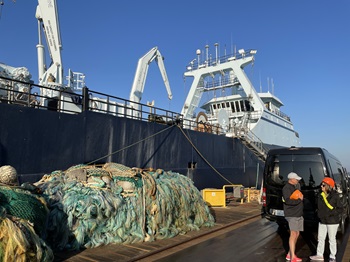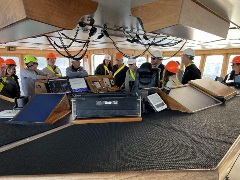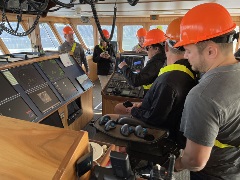By Steve Markenson, Director, Research & Insights, FMI

To start off National Seafood Month, FMI’s Seafood Strategy Leadership Council held our Fall meeting in Seattle. The weekend started early on a sunny Sunday morning (not the norm in Seattle) as Trident Seafoods, our host, took us on a tour of their state-of-the-art shipping vessel, Starbound. As we climbed the gangplank to the bridge of the ship, I was not prepared for just how enlightening of an experience the next two hours would be. Here are just a few things I learned:
Technology:
 I was in awe of the use of technology throughout the ship. Starting with the bridge, which would have been the envy of Captain Picard or Kirk, technology was everywhere. The captain’s chair was surrounded by an array of computer screens on three sides that allow the captain to navigate the ship, manage the depths of the fishing nets, adjust the motor speed, and even control the use of fuel. Technology is carried through the entire ship from the monitoring of the catch to an elaborate processing factory in the bow of the boat. They even have software engineers onshore who can remote access the ship to fix technology issues.
I was in awe of the use of technology throughout the ship. Starting with the bridge, which would have been the envy of Captain Picard or Kirk, technology was everywhere. The captain’s chair was surrounded by an array of computer screens on three sides that allow the captain to navigate the ship, manage the depths of the fishing nets, adjust the motor speed, and even control the use of fuel. Technology is carried through the entire ship from the monitoring of the catch to an elaborate processing factory in the bow of the boat. They even have software engineers onshore who can remote access the ship to fix technology issues.
Sustainability:
I was impressed with the focus on limiting bycatch, which is when they catch other species of seafood. The Starbound uses real-time information sharing with other vessels in the fleet and historical knowledge to identify appropriate areas to fish. This includes the sorting of the fish, which is overseen by a federal observer to ensure the bycatch is sampled and all catch is accounted. The federal observer also takes vital biological samples from the catch, which are used to inform scientific and management decisions. The operations onboard to process the catch use all the parts of the fish, leaving nothing to waste.
Workforce:
 When at sea the ship is an around-the-clock operation. A crew of roughly 130 workers alternate shifts to keep everything running. They are typically at sea for about three months, twice a year. The workers live in quarters just like the ones my family had on our Caribbean cruise. Everything is taken care of for them from food to laundry to medical care. While hard work and rough seas may not be for everyone, the company has a retention rate of about 90% of their crews from trip to trip.
When at sea the ship is an around-the-clock operation. A crew of roughly 130 workers alternate shifts to keep everything running. They are typically at sea for about three months, twice a year. The workers live in quarters just like the ones my family had on our Caribbean cruise. Everything is taken care of for them from food to laundry to medical care. While hard work and rough seas may not be for everyone, the company has a retention rate of about 90% of their crews from trip to trip.
We cannot thank Trident Seafoods enough for an incredible experience seeing the steps of how seafood comes from the ocean to our stores and on to our dinner tables in a sustainable way. Now, if you will excuse me, I must go get my fish (Alaska Pollock) and chips out of my air fryer and join my family for a tasty dinner.


 Industry Topics address your specific area of expertise with resources, reports, events and more.
Industry Topics address your specific area of expertise with resources, reports, events and more.
 Our Research covers consumer behavior and retail operation benchmarks so you can make informed business decisions.
Our Research covers consumer behavior and retail operation benchmarks so you can make informed business decisions.
 Events and Education including online and in-person help you advance your food retail career.
Events and Education including online and in-person help you advance your food retail career.
 Food Safety training, resources and guidance that help you create a company food safety culture.
Food Safety training, resources and guidance that help you create a company food safety culture.
 Government Affairs work — federal and state — on the latest food industry policy, regulatory and legislative issues.
Government Affairs work — federal and state — on the latest food industry policy, regulatory and legislative issues.
 Get Involved. From industry awards to newsletters and committees, these resources help you take advantage of your membership.
Get Involved. From industry awards to newsletters and committees, these resources help you take advantage of your membership.
 Best practices, guidance documents, infographics, signage and more for the food industry on the COVID-19 pandemic.
Best practices, guidance documents, infographics, signage and more for the food industry on the COVID-19 pandemic.
